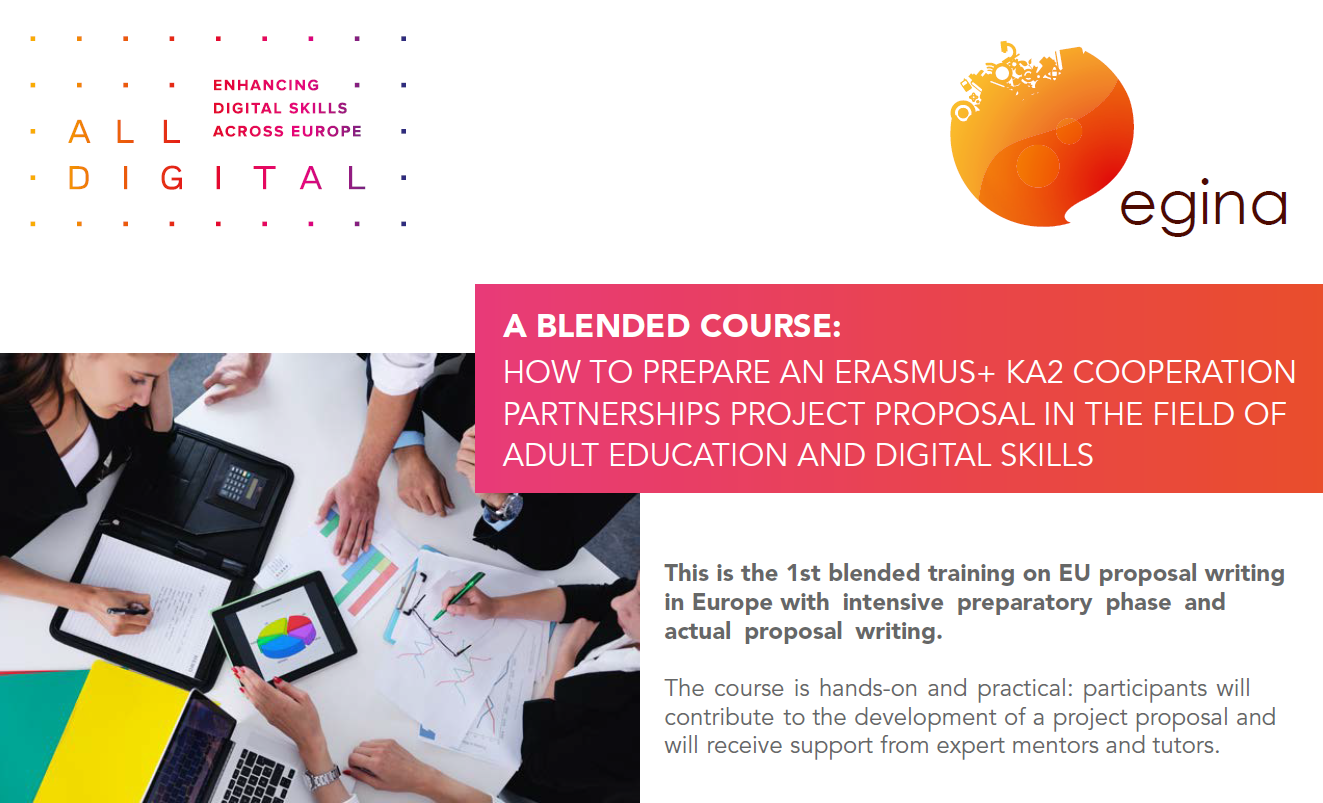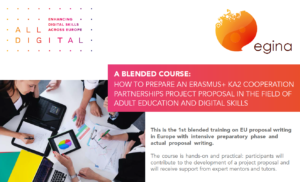
20 Jan Blended course: How to prepare an Erasmus+ KA2 Cooperation Partnerships project proposal in the field of adult education and digital skills
20 Jan, 2020
Scroll down to register!
Language of the course
The blended course will be entirely delivered in English
Duration of the course
The overall duration of the blended course is 40 hours: 15 hours of online preparatory activities and 25 hours (five days) of face-to-face practical sessions and group activities.
Dates of the course and location
- Online preparatory activities start 25 October 2021
- Five days of face-to-face practical sessions and group activities will be held in Foligno, Umbria Region, Italy 8 until 12 November 2021
- Online follow up activities until the 25 November 2021
Course Fee
- 825 EUR including: course registration fee; accommodation in a twin room (min. 2 people) for 5 nights; breakfasts, lunches, dinners and coffee breaks for the entire duration of the course; cultural activities (visiting Assisi and the surrounding areas by bus). Travel costs are not included.
- 885 EUR including: course registration fee; accommodation in a single room for 5 nights; breakfast, lunches, dinners and coffee breaks for the entire duration of the course; cultural activities (visiting Assisi and the surrounding areas by bus). Travel costs are not included.
Please note that your organisation can consider using the Erasmus+ KA1 mobility grant to fund your participation in the course!
DOWNLOAD THE COURSE BROCHURE TO LEARN MORE
(The brochure will be available soon)
Registration
Registration is mandatory. You can register here or use the form below by 15 October 2021
Information
If you need more information about the course, please contact barbara.quarta(at)all-digital.org or altheovalentini (at)egina.eu
Target audience
The course is addressed to adult education trainers and teachers, e-facilitators, project managers, researchers and all actors (digital competence centers, SMEs, NGOs, VET providers, universities, public entities etc.) interested in applying for Erasmus+ KA2 Cooperation Partnerships project funding to improve the educational experience and digital skills of adult learners.
Cooperation Partnerships are open to any type of organisation active in any field of education, training and youth or other socio-economic sectors as well as to organisations carrying out activities that are transversal to different fields (e.g. local and regional authorities, recognition and validation centres, chambers of commerce, trade organisations, guidance centres, cultural organisations).
Overview of the course
The goal of the course is to provide guidance for successful Erasmus+ KA2 CooperationPartnerships project proposals submission in the field of adult education, with a focus on digital skills development.
This is the 1st blended training on EU proposal writing in Europe with intensive preparatory phase and actual proposal writing. The course is hands-on and practical: participants will contribute to developing a project proposal and will constantly receive the support from expert mentors and tutors.
Participants will acquire theoretical knowledge, as well as carry out practical work, gaining valuable experience in project proposals. Divided into smaller groups, they will complete different tasks related to planning and writing a project proposal.
During the training, different tools will be made available by the organizers: work plan for the submission process; project concept note template; detailed work plan template; internal detailed budget template; an online collaboration platform for group work (e.g. Basecamp), etc.
The course is an excellent networking opportunity for participants who want to establish potential partnerships for future applications.
Learning Outcomes
Participants will learn about:
- How to read and understand the Erasmus+ Call, guidelines, e-form, and tools;
- How to plan the submission process (steps, roles, deadlines for tasks, division of responsibilities, collection of documents etc.) and accomplish the essential procedures to submit the proposal;
- How to design an innovative project idea in the field of adult education (goals, objectives, activities, expected results, impact, dissemination, etc.);
- How to identify Intellectual Outputs and produce a detailed project work plan;
- How to plan a sound project management and quality assurance;
- How to plan dissemination and exploitation;
- How to plan the financial aspects of the project and produce a balanced budget;
- How to build a strong partnership.
Programme of the blended course
- 25 October – 5 November 2021: 10 hours of online preparatory activities (sharing and review of project ideas on Basecamp, organization of a webinar, setting up working groups, etc.)
- 8 – 12 November 2021: 5 days of on site training in Foligno, Italy.
- 15 – 25 November 2021: 5 hours on online follow up activities
Programme of the five-day face-to-face training in Foligno
DAY 1: Analysis of the specific Call and e-form
- Presentation of the course program and planned activities
- Short presentation of the participants and their experiences
- Introduction to Erasmus+ Call KA2 Cooperation Partnerships supporting innovation in the field of adult education: overview of the objectives and priorities, supported activities, award criteria, eligibility and funding rules
- Overview of all sections of the application e-form and where to find the forms
- How to build a successful partnership: searching for partners, assigning roles and distributing tasks and responsibilities among the partnership
- Description of the steps to submit the proposal: submission timeline including checklist of documents to produce and to collect.
- Reference documents and tools
DAY 2: Generation of project ideas – project work 1
- Presentation of two examples of successful KA2 applications
- Project Work – 1st group activity on the generation of innovative project ideas: participants are clustered in groups, according to the chosen topic/priority and target groups they want to address in the proposal, to generate innovative project ideas. The groups are based on the ones already created online. Each group will be asked to collaboratively produce a more elaborated project concept note using a template provided by the organizer
- Presentation of project ideas by the participants
- Interactive session to provide feedback and guidance to participants
DAY 3: Identification of project results, Learning/Teaching/Training (LTT) activities and preparation of the work plan – Project Work 2
- How to identify eligible results linked to project objectives and produce a realistic and detailed work plan: examples from successful projects
- How to plan transnational LTT activities: examples of different types of activities
- Project Work – 2nd group activity on the production of the project work plan: the groups will produce a detailed work plan based on the project ideas generated on Day 2. Participants will be provided with a Gantt chart template.
- Presentation of produced work plan by the participants
- Interactive session to provide feedback and guidance to participants
DAY 4: Analysis of project impact, dissemination & sustainability – Project Work 3
- Analysis of the impact of the project, and desired impact at local, national European level; tips for successful Dissemination and use of projects’ results
- Project Work – 3rd group activity on project impact, dissemination and use of projects’ results; the groups will complete the specific proposal’s sections
- Presentation of produced work by the participants
- Interactive session to provide feedback and guidance to participants
DAY 5: Financial aspects and project management & implementation activities – Project Work 4
- Analysis of budget according to the rules of the Call: how to use budget tools and calculate the budget in the e-form
- How to make a good and balanced allocation of resources; examples from successful projects
- Project Work – 4th group activity on project budget: each group, under the supervision of the tutor, makes an exercise of allocating the resources within the potential partnership and creates the first draft of the budget using an internal spreadsheet provided by the organizer
- Final interactive session to provide feedback and guidance to participants
- Final Q&A session and end of the training





